Welcome to the Yinside of yoga and life!
In this four-part Wellness Yoga course, you will have the unique opportunity to learn about the philosophy and practice of Yin Yoga with renowned yoga teacher Bernie Clark, author of the best-selling book The Complete Guide to Yin Yoga and the creator of the www.yinyoga.com website.
When most people think of yoga, they think about the “yang” styles of yoga. These vigorous, fast-paced classes– like vinyasa, Power yoga, and Ashtanga build internal heat and flow rapidly through postures.
However, as Bernie Clark will show in this course, another equally valuable style provides an important counterpoint: Yin Yoga. Learn about the foundations of Yin yoga and how to incorporate its numerous benefits for wellbeing into your practice.
So, what is Yin Yoga anyway?
While yang yoga zeroes in on the muscles, Yin Yoga targets the deeper connective tissues like fascia, ligaments, and joints.
Yin Yoga classes move slower and focus inward, giving space to tune into mind and body. Because we hold poses longer than traditional yoga classes, Yin Yoga effectively targets the connective tissues and teaches mindfulness of physical sensations and breath.
Yin Yoga draws from ancient Chinese medicine traditions, which view our health as dependent on the free flow of energy, or Qi, through the body’s energy channels.
In a Yin Yoga practice, by patiently easing into poses, we facilitate the release of blockages and open channels for Qi to move freely.
Rather than flowing rapidly between postures, in Yin Yoga, we linger – holding poses from three to twenty minutes – to access deeper tissues like joints and fascia. The intention includes full relaxation of muscle tissues to benefit joints, hips, spine, and more.
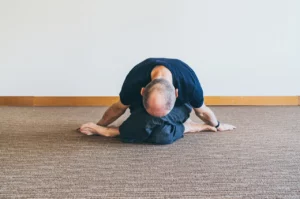 There are three main principles in Yin Yoga, notes Bernie Clark.
There are three main principles in Yin Yoga, notes Bernie Clark.
The first principle is playing your edge, which means entering the posture to a depth where you naturally stop. This is the first edge.
The second principle is stillness. Once you have arrived at your edge, we cultivate stillness.
The third principle is time. We remain at the edge for time, and over time, we discover that the edge may move. We are invited to go deeper.
Once this happens, we repeat the process of coming to the edge, becoming still, and lingering.
What You Will Learn
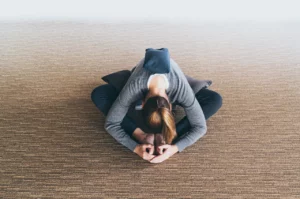 Week One: Playing Your Edge. In this class, we will explore the three principles of Yin Yoga and also develop a functional approach to our yoga practice. A functional approach means that we will have both an intention for each posture and we will pay attention to ensure we are achieving what we want. Along the way, we will move the spine and hips in all six of their possible directions.
Week One: Playing Your Edge. In this class, we will explore the three principles of Yin Yoga and also develop a functional approach to our yoga practice. A functional approach means that we will have both an intention for each posture and we will pay attention to ensure we are achieving what we want. Along the way, we will move the spine and hips in all six of their possible directions.
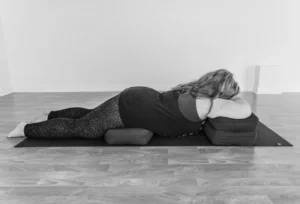 Week Two: Antifragility. In this class, we will focus mostly on the spine, but while we marinate in the postures, we will also explore the importance of exercising all tissues in the body, including the deeper tissues of the bones and fascia. Through our practice, we seek to help our bodies move from fragility to antifragility.
Week Two: Antifragility. In this class, we will focus mostly on the spine, but while we marinate in the postures, we will also explore the importance of exercising all tissues in the body, including the deeper tissues of the bones and fascia. Through our practice, we seek to help our bodies move from fragility to antifragility.
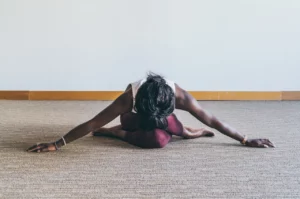 Week Three: Energy. Physiologically, this week’s class will focus mostly on the hips. While we linger long in the depths of these postures, we will explore the energetic qualities of the practice. We will contrast the Eastern concepts of prana and chi with the Western views of Energy Medicine.
Week Three: Energy. Physiologically, this week’s class will focus mostly on the hips. While we linger long in the depths of these postures, we will explore the energetic qualities of the practice. We will contrast the Eastern concepts of prana and chi with the Western views of Energy Medicine.
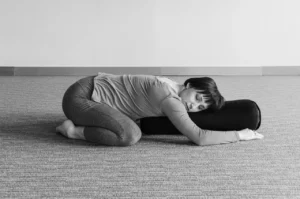 Week Four: Mindfulness. Again, we will target the spine, hips, and upper body. While we stay quietly in the postures, we will deepen our awareness of what is happening through mini-meditations and mindfulness practices.
Week Four: Mindfulness. Again, we will target the spine, hips, and upper body. While we stay quietly in the postures, we will deepen our awareness of what is happening through mini-meditations and mindfulness practices.



